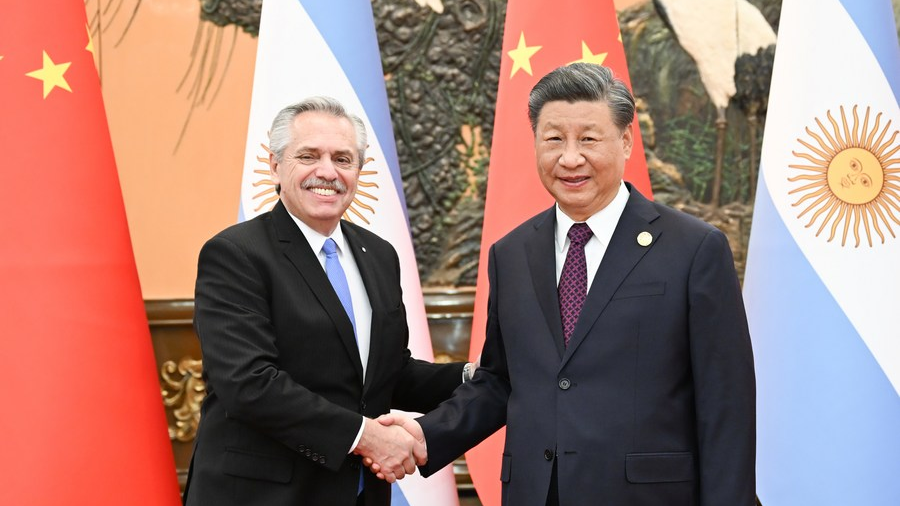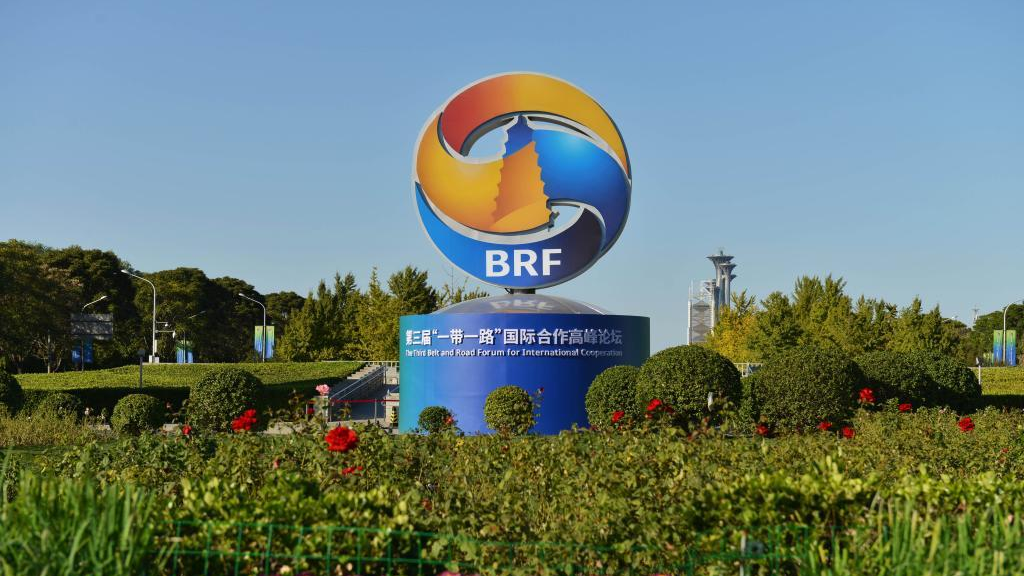
Chinese President Xi Jinping (R) meets with Argentine President Alberto Fernandez (L) at the Great Hall of the People in Beijing, capital of China, October 18, 2023. /Xinhua
Chinese President Xi Jinping (R) meets with Argentine President Alberto Fernandez (L) at the Great Hall of the People in Beijing, capital of China, October 18, 2023. /Xinhua
Editor's note: Azhar Azam, a special commentator on current affairs for CGTN, works in a private organization as a market and business analyst and writes about geopolitical issues and regional conflicts. The article reflects the author's opinions and not necessarily those of CGTN.
"China is a very large country. It is a country that objectively leads international trade, and it is a country that has really treated Argentina very well," Argentine President Alberto Fernandez said recently. Recalling his several meetings with Xi Jinping, he said the Chinese president has been very supportive of him.
In February 2022, Fernandez came to China to meet Xi and attend the opening ceremony of the 2022 Beijing Winter Olympics. At a time when the South American country greatly needed support to boost its economy, he signed a memorandum of understanding (MoU) on the Belt and Road Initiative (BRI), marking a true jubilation of the 50th anniversary of the establishment of the China-Argentina diplomatic relation. "This strategic decision will allow the national government to sign different agreements that guarantee financing for investments and works for more than $23.7 billion," said Argentina's government.
Fernandez highly praised China's alacrity to treat other countries with "great respect" rather than seeking them into submission, and the role of BRI in promoting development in Argentina and serving as a paradigm for unconditional multilateralism. It was clearly reflected in his recent interview, in which he called Beijing a "genuine investor" and a "valuable partner and friend."
According to Argentina's media, ahead of his trip to China to attend a host of meetings including the third Belt and Road Forum for International Cooperation, Fernandez reaffirmed his intent of joining the BRICS and extending his support for the BRI.
Following signing the MoU on the BRI, Argentina in June agreed on a cooperation plan with China, including new infrastructure projects. Buenos Aires has been keen to move forward with infrastructure projects, in an effort to improve its connectivity with the world market and better integrate itself with regional and international economies, especially those in Asia.
The cooperation plan on infrastructure projects aims to increase Argentina's productivity, promote its development, and improve the people's well-being. For instance, the China Machinery Engineering Corporation told Fernandez it had completed around $2.47 billion of infrastructure projects in Argentina, reducing the cost of transportation and generating 4,800 direct jobs.
With the plan encompassing 13 sectors of strategic cooperation including education, tourism, sports, science and technology, and defense – Argentina's participation in the BRI contributes to the country's all-round development.

A floral decoration for the third Belt and Road Forum for International Cooperation near Beichen Road in Beijing, capital of China, October 14, 2023. /Xinhua
A floral decoration for the third Belt and Road Forum for International Cooperation near Beichen Road in Beijing, capital of China, October 14, 2023. /Xinhua
Argentina's decision to join the BRI is crucial for its economic diversification and green development since Beijing has already invested in Argentinian sectors and industries such as agriculture, finance, meat, automotive, fishing, and telecommunication as well as oil and gas, transportation, and alternative energy and the project – believed to have the potential to "facilitate an economic recovery" based on sustainable development and clean energy transition. As a BRI partner, it will attract more Chinese investments.
China is Argentina's second-largest export destination and trading partner. Bilateral trade between the two countries was projected to have increased from $2.3 billion in 2001 to $21.4 billion in 2022. Argentina's ambassador to China is hopeful that the BRI could turn Beijing into Buenos Aires primary trading partner as China's global development initiative continues to solidify its position as the most "significant infrastructure plan."
Buenos Aires has also signed a currency swap deal with Beijing, helping the country to stem the sharp contraction of its foreign exchange reserves after a historic drought slashed its main source of dollar revenue, grain exports. In June, the Argentinian central bank said it had signed a deal to renew the total 130 billion yuan (around $18.4 billion) swap line for three more years, eventually doubling the free accessible part of the swap from 35 billion yuan to 70 billion yuan.
Shortly after South Africa's President in August announced to admission of six countries including Argentina into the BRICS, Fernandez hailed it a "great opportunity," saying the invitation to join the group of emerging economies would herald new economic possibilities for his country such as joining new markets, consolidating existing markets, raising investment, creating jobs and increasing imports.
BRICS has emerged as a strong force in the Global South with 64 percent of its GDP. Once it becomes a member on January 1, 2024, Argentina will be the second Latin American country besides Brazil to join "the most relevant forum" globally that in 2022 roughly represented 26 percent of global GDP and 21 percent of global trade respectively and whose contribution in international economic output will reach 29 percent with the addition of six more countries, according to the United Nations Conference on Trade and Development.
Argentina's enrollment into BRICS will elevate its own and the region's profile internationally, opening the floodgates of a "profound trade development" and helping the government to rein in several economic crises. Upon his arrival, Fernandez, according to the president's office, locked a deal with a Chinese company that plans to invest $2.2 billion in two lithium projects in Argentina, creating 10,000 jobs, and met Huawei president in Latin America and the Caribbean, underscoring the importance of foreign investment. All these latest developments and statistics emphasize Beijing's critical role in Argentina's economic revitalization and the necessity to shore up the strategic partnership.
(If you want to contribute and have specific expertise, please contact us at opinions@cgtn.com. Follow @thouse_opinions on Twitter to discover the latest commentaries in the CGTN Opinion Section.)